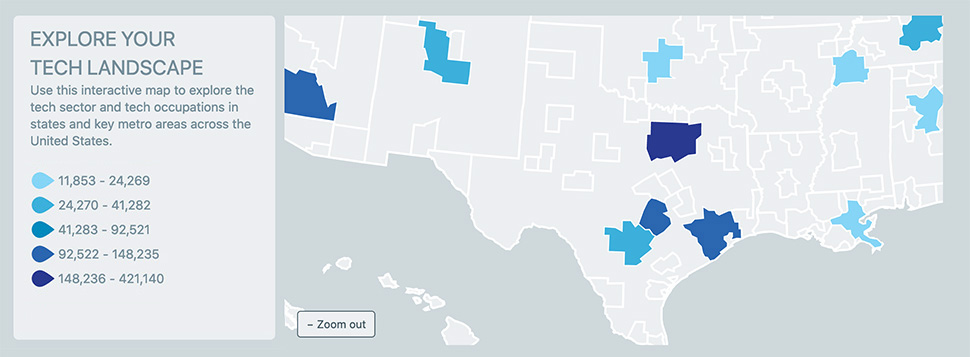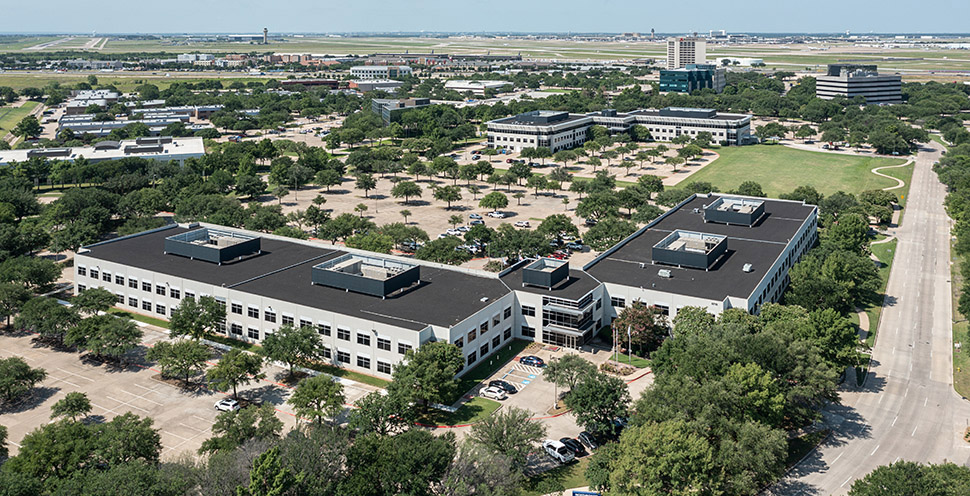The Computing Technology Industry Association (CompTIA) has released a new report showing that information technology employment in the U.S. has reached around 12.1 million workers. That means the decade ended with an expansion of 2.3 million jobs. And, the Dallas-Fort Worth-Arlington metro accounts for a decently sized chunk of that.
In the annual Cyberstates 2020—CompTIA calls it “the definitive guide to the U.S. tech industry, occupations, and trends”—the Dallas area is seventh for net tech employment with 361,849 jobs. It ranks No. 6 for net tech jobs added with 9,932 in 2019. Over the last decade, 77,607 jobs were added.
The state, as a whole, shines. Texas ranks No. 2 for its tech base, behind California at No. 1. Net tech employment garnered the ranking with 1,025,106 jobs. Texas (+27,466) also came in second behind California (+61,195) for net tech employment gains in 2019.
Within Texas, the DFW region ranks higher than anywhere else in job gains, but still falls behind other large metros like San Francisco (+21,046), San Jose (+15,727), New York City (+13,513), and Seattle (+12,605). Austin was the closest behind with 7,131 jobs added and a No. 10 ranking.

Go here to explore your own tech landscape. [Screenshot: via CompTIA]
While “Silicon Valley continues to be a critically important hub for innovation,” CompTIA says in the report, technology has a “significant presence across the nation” in cities such as Dallas, Boston, Seattle, New York, and others.
Dallas also was noted for its base of business establishments, which is considered to be a measure of a healthy tech sector. Outside the top five metros—led by New York City with some 24,000 tech business establishments—the next largest areas by the number of tech in business establishments are Boston, Dallas, Atlanta, Seattle, and Denver, according to the report.
In total, CompTIA said the tech sector accounts for around 10 percent of the country’s economy. And while it’s hard to look ahead, especially during a global pandemic, President and CEO Todd Thibodeaux pointed out that companies must stay committed to preparing the workforce of tomorrow.
“Technology powered job growth and economic gains in the past decade while delivering countless benefits in how we work, communicate, create, and share. Looking ahead, the need for professionals from all backgrounds to develop, support, and protect these technologies will continue to grow,” he said. “We have a tremendous opportunity and responsibility to mobilize the best ideas and resources across our industry members, learning partners, and government to build on the progress we’ve made.”
Tech is tops for economic impact
Dallas-Fort Worth is comparable to national statistics. 12.4 percent of the tech sector is estimated to directly contribute to our local economy. Tech ranked No. 1 for economic impact in Dallas in 2019, relative to the other major industry sectors, including finance and insurance (No. 2), manufacturing (No. 3), and professional services (No. 4).
And, CompTIA put net tech employment at 9.5 percent of the region’s overall workforce.
To break it down, those numbers, according to CompTIA, equates to:
• 12,209 tech business establishments
• 187.5K tech occupation job postings
• 37.5K emerging tech job postings
But, in DFW, median tech wages are $87,201—91 percent higher than median national wages.
CompTIA listed leading local jobs as software and web developers; network architects, admins, and support; and computer support specialists. Leading sectors are IT services and custom software services, telecommunications and internet services, and tech manufacturing.
Cyberstates 2020 follows CompTIA Tech Town report released in December that listed Dallas-Fort Worth as a big draw for tech companies and tech workers. The Dallas-Fort Worth-Arlington metro area ranked No. 7 among the nation’s Top 20 Best Tech Cities for IT jobs, one spot away from its No. 6 ranking in the 2018 index.
Cyberstates, however, is designed to be a reference tool. CompTIA said it wanted to make national, state, and metropolitan area-level data accessible, quantifying the “size and scope of the tech industry and the tech workforce across multiple vectors.”
The PDF version of the report is available here (Dallas is on page 83). An interactive version is also available to explore online, with a shortcut to Dallas-Fort Worth-Arlington here.
Cyberstates is based on CompTIA’s analysis of data from the U.S. Bureau of Labor Statistics, U.S. Bureau of Economic Analysis, Economic Modeling Specialists International (EMSI), Burning Glass Technologies, Hoovers and other sources.
![]()
Get on the list.
Dallas Innovates, every day.
Sign up to keep your eye on what’s new and next in Dallas-Fort Worth, every day.





































































